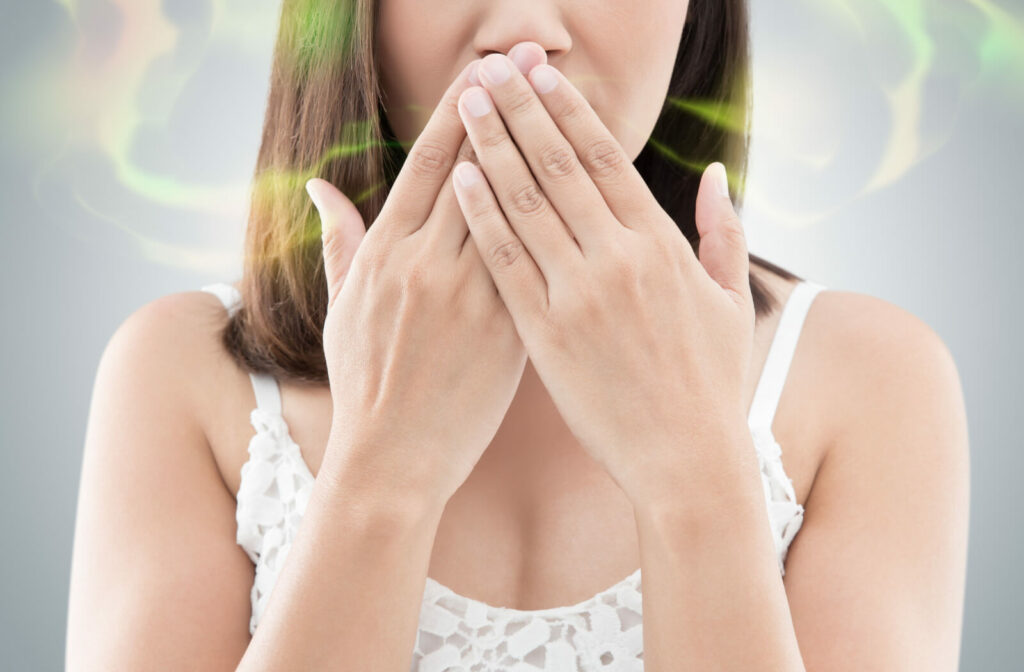Good oral hygiene habits and regular dental exams and cleanings can help prevent gum disease. But sometimes, even with preventative and proactive measures, bad breath can linger, which may indicate an underlying health problem.
While persistent bad breath is a sign of gum disease, bacteria that cause stomach ulcers can also trigger bad breath.
What Is Bad Breath?
Bad breath or halitosis is an unpleasant odour coming from the mouth. It can result from several factors, such as poor dental hygiene, unhealthy lifestyle habits, or made worse by certain foods.
Without adequate brushing and flossing, food particles can remain in the mouth, promoting bacterial growth that causes bad breath. Other causes of bad breath can include:
- Gum disease
- Poorly fitted dental appliances
- Dentures not cleaned properly
- Yeast infections of the mouth
- Dry mouth
- Smoking or using tobacco products
But bad breath can also result from health problems.
The Stomach & Bad Breath
A stomach ulcer, or rather the bacteria that causes stomach ulcers—Helicobacter pylori, can be responsible for your bad breath.
Helicobacter pylori is a bacteria that is often the cause of gastritis and responsible for peptic ulcers and gastric cancer. It attacks and damages the tissues that line and protect your stomach.
The bacteria produce an enzyme called urease that neutralizes the acids in the stomach. A less acidic environment in the stomach can result in redness, inflammation, sores, or ulcers.
Besides bad breath, other symptoms of stomach ulcers can include:
- Burning sensation in the chest or heartburn
- Dull pain in the stomach
- Weight loss
- Lack of appetite
- Nausea or vomiting
- Bloating
- Burping or acid reflux
Another cause of bad breath from the stomach is gastroesophageal reflux disease (GERD). In GERD, acid comes back up the esophagus.
Accompanying bad breath, the acid can also cause tooth erosion and weaken the teeth. Damage to the throat and oral structures from the acid may also allow certain bacteria to grow in the mouth.
Diagnosing & Treating Stomach Ulcers
Stomach ulcers are treated based on symptoms and severity. Your healthcare provider can diagnose this condition by reviewing your medical history and symptoms.
Tests to diagnose stomach ulcers can include blood, stool, or breath tests. A breath test checks the presence of Helicobacter pylori, where results show higher than normal levels of carbon dioxide. Other procedures to test for stomach ulcers include:
- Barium swallow
- Endoscopy (EGD)
- Endoscopic biopsy
Non-surgical treatment for a stomach ulcer may include antibiotics and drugs if caused by Helicobacter pylori. Or, in rare cases, surgery to remove the ulcer.
Treating Bad Breath
Your dentist can determine if oral issues such as gum disease are responsible for your bad breath. If this is the case, they will confirm with bacteria testing to select the right treatment plan.
Treatment can include antibiotic rinse, oral antibiotic cream, or an antibacterial mouthwash to reduce gum inflammation and bleeding and improve bad breath.
If your bad breath has other causes, you may need to visit your doctor to rule out medications or health problems. Early diagnosis and treatment of stomach ulcers can resolve bad breath and possibly prevent other gastrointestinal disorders.
For bad breath caused by stomach issues, you can try the following measures:
- Stay hydrated
- Maintain good oral hygiene
- Avoid trigger foods
- Stay active
- Use alcohol-free mouthwash
- Consume probiotics
Preventing Bad Breath
Here are some ways to help prevent bad breath related to oral health:
- Brush twice daily with fluoride toothpaste. Brush after you eat to remove food debris and plaque. Replace your toothbrush every 2 to 3 months or after an illness.
- Floss daily to remove food particles and plaque between teeth.
- Rinse your mouth with water after you eat to loosen trapped food particles.
- Rinse your mouth with mouthwash to get rid of bacteria. Antiseptic mouthwash can help kill bacteria that cause bad breath.
- Scrape your tongue to clear it of smelly bacteria buildup.
- Avoid foods that sour your breath, such as onion and garlic.
- Chew sugarless gum or suck on sugarless candy after dinner to stimulate saliva production.
- Keep dentures, braces, and retainers clean.
- See your dentist at least twice a year for dental exams, professional cleaning, and treatments for periodontal disease, dry mouth, or other problems that may cause bad breath.
- Avoid smoking and using tobacco products.
- Eat more fruits and vegetables, as these can help clear plaque and food particles that cause bad breath.
Our Approach to Bad Breath
Good oral health can influence overall health and vice versa. Bad breath can be unpleasant and cause social discomfort. But seeking professional dental care if you have bad breath can help.
Book an appointment with Palermo Village Dental for diagnosis, treatment, and preventative care.




